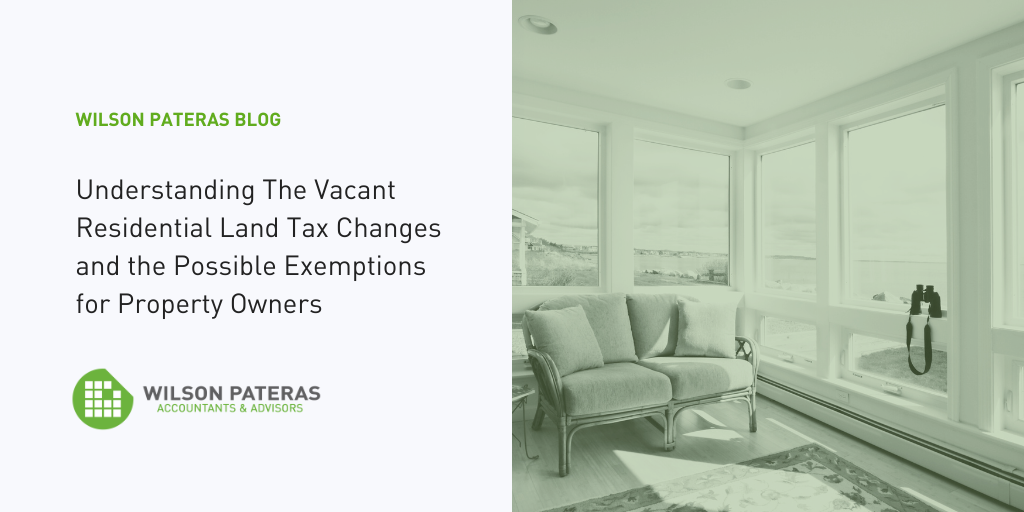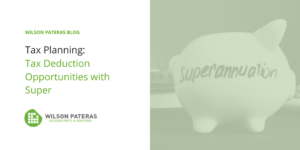
Victorian Treasurer Tim Pallas announced tax increases on vacant residential properties and undeveloped residential land. The new tax is not expected to have any short-term impact on property prices, however, it is forecast that an extra 700 vacant homes will be subject to the tax.
Do you have to pay vacant residential land tax?
If you own investment properties, holiday homes, vacant land, commercial properties, or non-exempt farmland you may be subject to additional land tax obligations.
These properties, while valuable assets, can incur additional taxation beyond standard rates due to their classification and usage. Understanding the implications of land tax on these property types is crucial for effective planning and compliance requirements.
What is considered as vacant land
This tax is based on three main principles:
- the land must be vacant for six months or more, within a year (whether contiguous or aggregate)
- it must be classified as residential land, and it must be capable of being used primarily for residential purposes. This includes land with a house or apartment, land undergoing renovation for residential use, or land where a previous residence has been demolished for a new residential build. It is important to note that this tax previously only applied to certain areas but has now been expanded to include all residential land in Victoria.
If you have any questions or concerns regarding the Vacant Residential Land Tax and how it may impact your property, please don’t hesitate to reach out to us.
Land tax surcharge for trusts
Trusts in Australia are subject to land tax surcharges, resulting in higher land tax for trusts with land valued at less than $3 million. However, once the land value exceeds $3 million, there is no difference in land tax.
Different rules apply to different types of trusts:
- discretionary trusts are subject to surcharge unless they qualify for the principal place of residence (PPR) or grandfather rules,
- unit trusts are subject to surcharge unless the SRO is notified of the unitholders of the trust,
- fixed trusts are subject to surcharge unless SRO is notified of the beneficiaries of the trust.
- self-managed superannuation funds (SMSFs) are never subject to land tax surcharge.
Land tax trust surcharge rates (from 2024 land tax year)
| Total taxable value of land holdings | Land tax payable |
| < $25,000 | Nil |
| $25,000 to < $50,000 | $82 plus 0.375% of amount > $25,000 |
| $50,000 to < $100,000 | $676 plus 0.375% of amount > $50,000 |
| $100,000 to < $250,000 | $1338 plus 0.375% of amount > $100,000 |
| $250,000 to < $600,000 | $1901 plus 0.675% of amount > $250,000 |
| $600,000 to < $1,000,000 | $4263 plus 0.975% of amount > $600,000 |
| $1,000,000 to < $1,800,000 | $8163 plus 1.275% of amount > $1,000,000 |
| $1,800,000 to < $3,000,000 | $18,363 plus 1.1072% of amount > $1,800,000 |
| $3,000,000 and over | $31,650 plus 2.65% of amount > $3,000,000 |
Trustee Notification requirements
The State Revenue Office (SRO) maintains an ongoing compliance program regarding the notification of trusts as acquirers of land. If you own land in trusts, it is important to review your land tax assessments to ensure they are correctly assessed in the name of the trust.
If assessments are not issued correctly, making a voluntary disclosure to the SRO is advisable, as voluntary disclosures are more likely to receive a waiver or reduction of penalties.
Ensuring compliance with trust notification requirements can help avoid potential penalties and ensure that your land tax obligations are accurately assessed.
Instances when a property may be eligible for an exemption from vacant residential land tax
Holiday Home Exemption: If your property serves as a holiday home and is occupied by you for at least four weeks a year, and you have a principal place of residence (PPR) in Australia, it may be exempt from vacant residential land tax.
Workplace or Business Attendance Exemption: Properties owned by individuals and occupied for at least 140 days a year for attending their workplace or business, where the individual has a PPR in Australia, can qualify for exemption from vacant residential land tax.
Renovation or Reconstruction Exemption: Homes undergoing significant renovations or reconstruction may not be considered vacant for up to two years from the date a building permit was issued. This period can be extended by the Commissioner under certain circumstances.
New Exemptions for Unimproved Residential Land: Land contiguous with principal place of residence land, land unsuitable for residential purposes, and land with a genuine intention for construction within five years may qualify for exemption.
Other Examples of Exempt Land
- Primary production land (ss 65, 66, 67)
- Sporting, recreational or cultural land owned by certain non-profit organisations (s 72)
- Land owned or used by charitable institutions (s 74)
- Health centres and services (s 74A)
- Rooming houses (s 75)
- Caravan parks (s 77)
- Retirement villages (s 78)
- Crown land (s 79)
If these exemptions are not applicable to you, you may have the opportunity to restructure your assets strategically to legally reduce land tax surcharges. It is essential to act before December 31, 2024, to maximise the benefits. Restructuring your assets will involve examining your asset portfolio including the way these assets are owned i.e. via a discretionary trust and their usage. We recommend you seek expert guidance to proactively explore exemption options or to consider whether an asset restructure is viable.
How to notify the SRO and claim an exemption
Landowners are required to notify the State Revenue Office (SRO) by 15 January of the following year that Vacant Residential Land Tax applies. This applies for both exempt and non-exempt properties. You must claim an exemption formally with the SRO, as the SRO will otherwise assume an exemption does not apply.
Notifications can be made on the following link to the online portal, however we recommend you seek legal advice before doing so.
You can Make A Notification Here
We would be pleased to work with you to explore whether you are eligible for an exemption or whether restructuring your asset portfolio is viable. Please do not hesitate to get in contact with our office.
This content has been prepared by Wilson Pateras to further our commitment to proactive services and advice for our clients, by providing current information and events. Any advice is of a general nature only and does not take into account your personal objectives or financial situation. Before making any decision, you should consider your particular circumstances and whether the information is suitable to your needs including by seeking professional advice. You should also read any relevant disclosure documents. Whilst every effort has been made to verify the accuracy of this information, Wilson Pateras, its officers, employees and agents disclaim all liability, to the extent permissible by law, for any error, inaccuracy in, or omission from, the information contained above including any loss or damage suffered by any person directly or indirectly through relying on this information. Liability limited by a scheme approved under Professional Standards Legislation.





